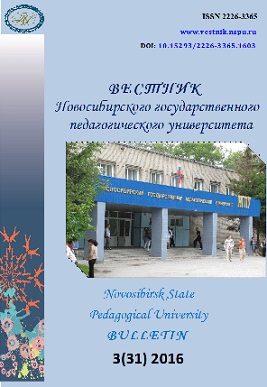Образование для устойчивого развития: глобальный и региональный аспекты
Education for sustainable development: global and regional aspects
Author(s): Natalia Nikolaevna Vlasyuk, Boris Olegovich MayerSubject(s): State/Government and Education, Sociology of Education
Published by: Новосибирский государственный педагогический университет
Keywords: Sustainable development; education for sustainable development; global citizen; system interaction of national and global aspects
Summary/Abstract: The purpose of the article is to justify the idea that education for sustainable development is a holistic and transformational system which adapts society to sustainable development through enabling people to become ‘global citizens’, able to accept and implement the ideas of sustainable development. One of the most significant current discussions is the problem of choosing a strategy for sustainable development of human civilization. It involves application of new approaches to identifying the place and role of education within sustainability paradigm. Education for sus-tainable development empowers people to be ‘global citizens’. ‘A global citizen’ is a member of an emerging world community, who is capable of acting at both local and global levels. The authors conclude that developing people as global citizens is a complex process of system interactions of national and global aspects based on the principle ‘think globally, act locally’. Sustainable development of society is a progressive straightforward process enhancing the opportunity to maintain positive growth. Education influences moral values of people as well as shared intellectual reality and socio-cultural environment, both at national and global levels. Therefore, education for sustainable development is a system aimed at nurturing the inte-grated person (‘global citizen’) capable to perceive and implement ideas of sustainable development.
Journal: Вестник Новосибирского государственного педагогического университета
- Issue Year: 6/2016
- Issue No: 3
- Page Range: 50-59
- Page Count: 10
- Language: English

